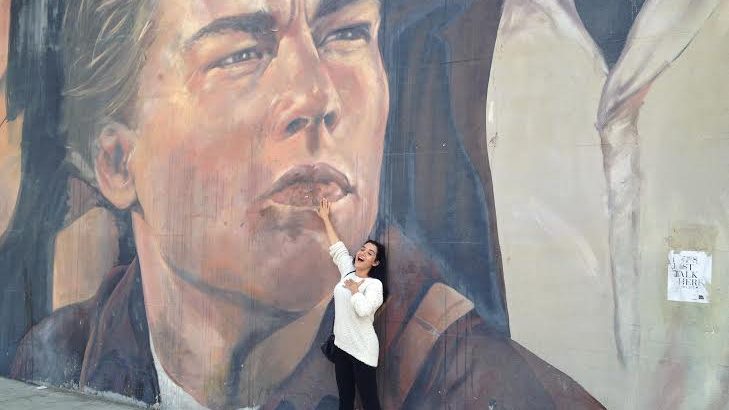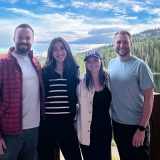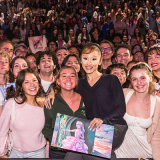
Alumni Spotlight – Ora Yashar
April 27, 2016
Every so often, we’ll be spotlighting alumni and what they are up to these days. These Q&A sessions will give you a bit of insight into where the world has taken them since graduation.
This week, the spotlight is on Ora Yashar (MFA/Film Production ’09).
DODGE: Share your career path with us – how did you get where you are now?
ORA: I graduated from Chapman in 2009, which was unfortunately right around the time of the recession. During school, I had interned at companies such as Scott Free (Ridley and Tony Scott), Film Rights (Steve Zaillian) and Samuel Goldwyn Films (Samuel Goldwyn Jr.). I built good relationships and made connections throughout my time at Chapman. I worked hard and did everything I was “supposed” to. Yet, when I graduated I didn’t find myself with an assistant position at an agency or studio as I thought I would. Many from my graduating class faced the same dilemma. However, through a Chapman connection I was able to land a Script Reading job, which really helped ground me. Fortunately, while at Chapman, I had also worked part-time in the Grip and Lighting Department of Raleigh Studios in Manhattan Beach (now MBS Media Campus). I had been inspired by Larry Parker, of Mole Richardson, who spoke at Chapman, to really know more about set equipment. When my boss at Raleigh heard of my rough time, he invited me back to work with the idea that I would perhaps end up on one of the shows shooting there. After several months, I was also invited to start working in the Raleigh mail room, which put me straight into every single production office on the lot.
During this time, Marvel Studios was located at Raleigh and after delivering their mail every single day I was informed that a front desk position would soon be open. After a series of interviews, I was ecstatic to land the job. A little over a year went by and I was promoted to Script Coordinator of the TV Animation division, which had just opened and I moved with the team to Glendale. I spent two more years at Marvel learning the ins and outs of the animation world and then placed my time into working on my own projects, which included a short film, a feature script and a set of PSAs I was selected to write and direct through Women in Film. I was particularly excited when the PSA I wrote for the Santa Monica Museum of Art was nominated for a 2015 Emmy.
One night, at a networking event, I ran into a friend from high school, who as chance would have it, was now a recruiter for Paramount Pictures. We got to talking and eventually I started doing some temp work at Paramount. After several months, I was presented with an opportunity as a Coordinator in the Licensing Department. I knew absolutely nothing about this side of the business, but was eager to expand my skill set and found the Licensing team at Paramount to be an amazing team of individuals. I’ve now been the Product Development Coordinator at the studio for a year and I am continuously excited by the situations I find myself in and the opportunities ahead.

Ora Yashar
DODGE: What was the biggest adjustment you faced after graduation and how did you overcome it?
ORA: As touched on before, the biggest adjustment I faced after graduation was whether or not I could land a job. Was I good enough? And once I did, would I ever make movies again? I had to learn not to doubt myself and just go for it. I constantly reminded myself of all the difficulties I faced on set, which I was always able to overcome and more often than not end up with a piece of work that people positively responded to and found emotionally engaging. I also had to learn that there is truly no set career path in the entertainment industry and just because I wasn’t doing what I thought I needed to be doing, it didn’t mean what I was doing was wrong. Talking to people who were more experienced than myself really helped me grow confident in what I could bring to the table as long as I kept at it.
DODGE: What is the best advice you have received and/or what advice would you give current students?
ORA: The best advice I’ve ever received is, “don’t give up”. Every successful person that I’ve spoken to has attributed this to their success. They didn’t go home and the other guy did. The difference is simply between doing and not doing. Along with this, the best piece of more specifically tailored advice I received was from Samuel Goldwyn Jr. during my time interning at SGF. Mr. Goldwyn was kind enough to really evaluate my skill set and the experiences I had had before coming to SGF. He felt I should launch my career through directing commercials. He was also very intuitive about who I was as a person, and as a result his advice never struck me as general. I felt he was right, but really didn’t put his advice into practice until years later, when I started my PSA work. It was then that I knew for sure he was spot on.
DODGE: What is your favorite memory from your time at Chapman?
ORA: The culmination of time I spent on set with my peers. The weeks and weekends spent on set sometimes felt like a dysfunctional Twilight Zone-esque summer camp. We all had our quirks, but when we came together we were a real troop. Nowhere have I grown so much, laughed so much and felt as truly inspired.
DODGE: What have you taken from the classroom and applied to your career?
ORA: Know your stuff, know everything and be humble. It’s not enough to be good at what you do. You need to understand what everyone else does, why it matters and how that knowledge will strengthen your own skill set. That’s how you’re going to grow. And once you have it all figured out, be nice!
Every single class I took at Chapman contributed, in some fashion, to my current skill set and attitude. I may never quite understand why editing class started at 8am, but I do know what I learned was invaluable. At the end of the day, it’s all about communication. How do we communicate as people? How should we communicate? As an artist, how do you communicate your vision to a larger audience and get them as excited about it as you are? At Chapman, you’re thrown into classes with professors and students of varying personalities and it’s your job to communicate effectively and get these individuals on your team. Once you’re able to establish that initial moment of connection, people will want to help you even if you/your story are not their cup of tea. Hollywood is very much like this – if you can effectively communicate and make yourself relatable to others they will be more willing to help you.
DODGE: Have you received any awards or recognition?
ORA: A PSA I wrote for the Santa Monica Museum of Art was nominated for a 2015 Emmy.

